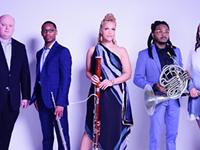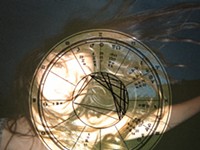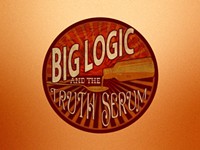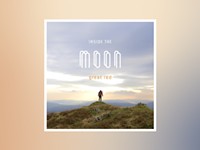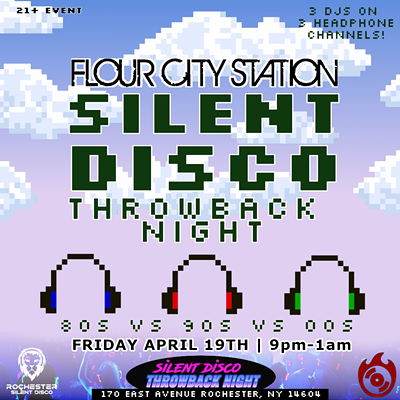[
{
"name": "500x250 Ad",
"insertPoint": "5",
"component": "15667920",
"parentWrapperClass": "",
"requiredCountToDisplay": "1"
}
]
"Do you think because it was written 200 years ago it can't be relevant?" says Christopher Seaman, Rochester Philharmonic Orchestra's music director.
Well, yeah... kinda.
"You're assuming that human nature has changed," he says. "And it hasn't --- unfortunately and fortunately both. And the emotions that Beethoven had before he wrote one of his symphonies would be very similar to the emotions that you and I might have or that anyone we know has."
I recently had a sit-down with Seaman. The amount of knowledge this man has about music is proportionate to the amount I don't. He was more than willing to patiently share, clarify, dispute, and maybe even convert someone like me.
It's not that I've lost my thrill for rock 'n' roll. Loud guitar, bass, and drums will always be my holy trinity. My jazz jones still burns bright, and I'm always up for that sweet soul music whenever I have the blues.
But lately it seems that those old familiar places are getting a little worn. I've heard it before. I want to be challenged and excited again. I want to learn. And as contradictory as this may seem, I've been thinking that the new sound could be something I've always gone out of my way to avoid: classical. It's big, it's bold, it's majestic, and I don't really know the first thing about it. Perfect.
Classical music was forced on me at an early age. It blared from every radio in the house and out of the family station wagon's dash. So naturally I rebelled. It was boring, longwinded, and well, just really boring.
In all fairness, some pieces did stick with me: the more bombastic, grandiose ones that had a discernable melody and cool things a boy could gravitate to, like say the cannons in Tchaikovsky's "1812 Overture," the bold majesty of Grieg's "In the Hall of the Mountain King," or the swirling haunt of Mussorgsky's "Night on Bald Mountain." Aside from that, though, I carried a disdain for all things classical into adulthood.
Seaman's patience, passion, and talent are matched only by his extensive knowledge of music, knowledge he quickly dismisses, despite his music degree from Cambridge.
"Not everyone has an extensive education," he says, "and thank goodness. Education addles the brain for a lot of musicians. It turns them into pseuds, posers, and opinionated, dry, shriveled persons. It's not an academic matter. It's an emotional matter."
Yet between the conductor's reading of the composer's emotions and the ear of the listener, speed bumps arise. The intricate arrangements --- instrument upon instrument, part upon part --- get heaped on, creating --- at least in me --- an element of confusion.
"What it has that some people find intimidating is a certain complexity that rock music does not have," Seaman says. "I feel that people should not be intimidated by that, because if you analyze rock music in a particular way you could [discover] a huge amount of complexity. However complex a great classical piece is, the message and the emotion of the music should come right at you and hit you in the face."
That's exactly what I'm looking for.
Except that human emotion is jagged, ragged, and unpredictable. Jazz makes room for this in its improvisation. The blues' personal imperfections add up to pure honesty. And rock music's visceral unpredictability and danger --- particularly live --- accurately mirror the rollercoaster reality in a lot of our lives. Classical music, in all its flawlessness and precise performances, seems at times almost too good to be true.
"There's not much room for improvisation," Seaman says. "And the reason we can't do that is that part of the emotional effect of classical music depends on its shape and its structure. And if you do that, it becomes lopsided and when it reaches you it doesn't reach you in the right shape."
I have to wonder then how an artist can put their fingerprint on something so predetermined and regimented. There's not a lot of room to move.
"It's in the way you read a poem," he says, "'Shall I compare thee to a summer's day,' and now you say it --- totally different. Your interpretation, my interpretation --- both valid. We didn't change the words. So I don't change the notes but the way we play them --- the pacing, the phrasing, the balance, waiting a little bit here, taking a little time there, or moving on a bit --- that's what you do in interpreting classical music."
To get the ball rolling, I needed to take a symphonic plunge of sorts and actually start listening. Seaman recommended five must-hear pieces to get me started.
"Mozart's Symphony in G Minor #40," he says. "Because the wonderful thing with Mozart is he is never in the same mood for 10 seconds in the piece. He has this quicksilver, immensely subtle change of mood. It's a relatively quick piece of music and you get this sense of shifting sand and of a soul searching in a hurry."
He also recommended Tchaikovsky's "1812 Overture" because of its drama, excitement, and big finish.
"Some people are very snobbish about it," he says, "the cannons come in and all the fireworks go off and all that and some people think it's a bit of a warhorse."
"Someone who is excited by rhythm should hear The Rite of Spring by Stravinsky," he says. "This is a ballet about pagan primitive fertility rites and it caused a great outrage when it was done about 100 years ago in Paris. But the rhythms are wonderful because they're not like pop and rock. They're very powerful but they're irregular. You can't tap your foot to them."
Seaman completed his list with Mendelssohn's "Italian" Symphony --- describing it as "a ray of sunshine, bright and cheerful" --- and the "Hallelujah" chorusfrom Handel's Messiah for its universal appeal.
"Everybody latches onto it for some reason," he says.
So I cleared my head and opened my mind to these five classics. I was surprised to find I was familiar with just about all of them. I had sung the Messiah in high school chorus and it filled me with a certain amount of nostalgia for a time when I had Christmas spirit. I still find it grand and uplifting.
The Mozart piece was familiar too. I can probably thank Bugs Bunny for that. And though it was minor-keyed it struck me as upbeat and lighthearted. I do agree with Seaman's observation of Mozart's hairpin mood shifts.
"The 1812 Overture" has a lot to offer in its story. There's the prayer at the beginning, the march of Russian and French troops, the battle, and the big dramatic finish complete with cannons. All these years later and that's still my favorite part.
I wonder if I would have imagined spring as I listened to The Rite of Spring if the word weren't in the title. This piece blooms beautifully and the rhythm is challenging, genius, and consistent with weather's inclemency.
However Mendelssohn's "Italian" Symphony had the tiresome, seemingly directionless qualities I had previously associated with all classical music.
But, four of five ain't so bad. Look, I'm not aiming at being an expert, I just wanna enjoy more. It just feels like I have to wade through so much.
Seaman sympathizes.
"We walk on like Victorian morticians and walk off again," he says. "I know what it feels like to sit at a concert, the music starts and I think, 'What the heck am I supposed to getting out of this?'"
"The thing that makes people love music," he says, "is going to a concert and a great orchestra plays something and it gets to you and it wraps itself round your ears and goes to the heart."
I'm game. Here goes.
Watch for more in upcoming issues of City as Frank De Blase enters the classical abyss.


